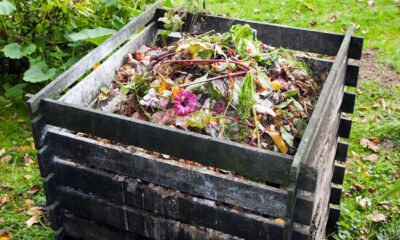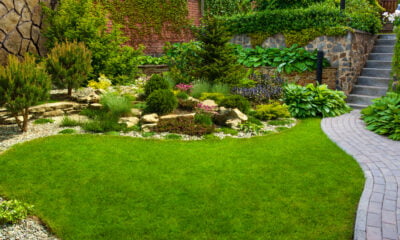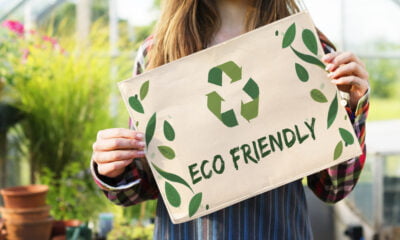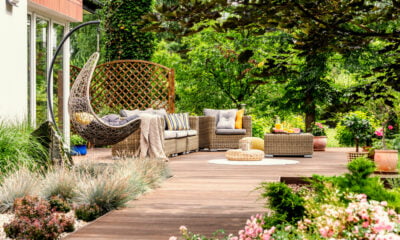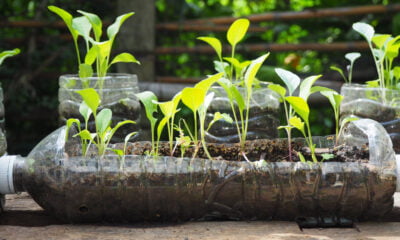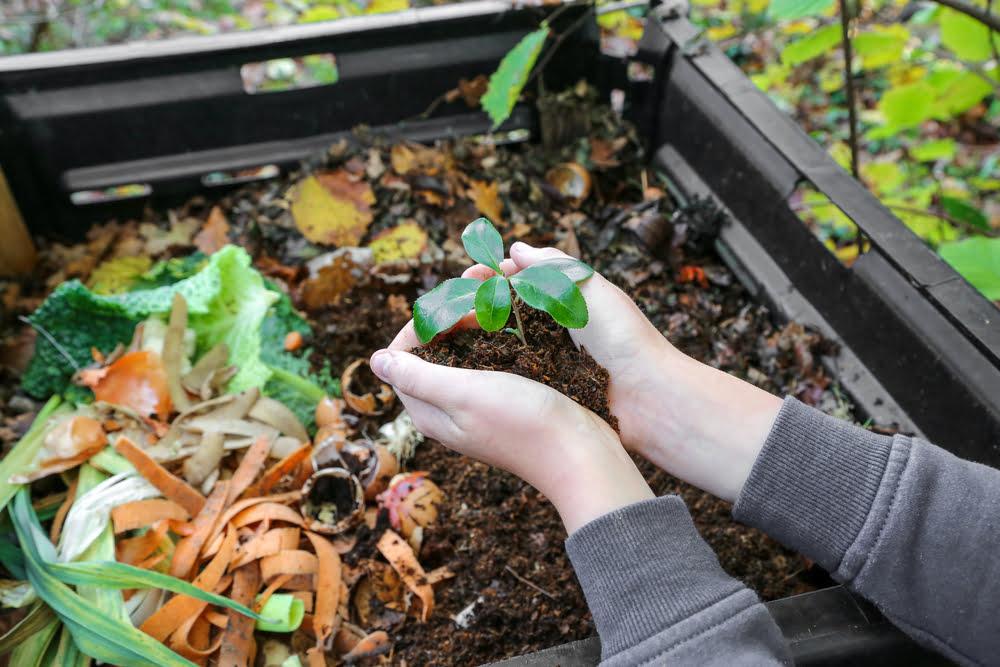
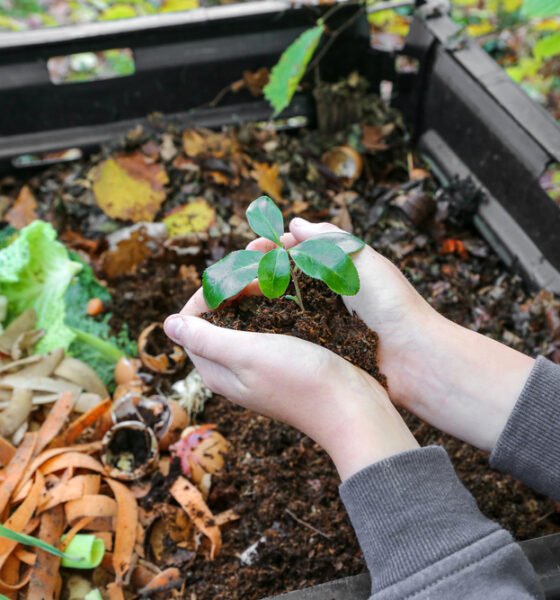
Environment
Eco-Friendly Composting Tips that All Gardeneners Should Follow
The National Wildlife Federation has stated that making a garden can be a great way to curb our carbon footprint. Many Americans seem to have gotten the memo and are making their own gardens.
One study found that 80% of Americans are growing their own food. While many want to be self-sufficient and save money, many others want to lower their carbon footprint.
Every eco-friendly gardener needs to invest in compost. This may seem like a lot of work, but you will have an easier time sticking with it if you appreciate the benefits of creating an eco-friendly garden to lower your carbon footprint.
Eco-Friendly Gardeners Need to Make Composting a Priority
With every passing day, we hear more news about the problems caused by climate change. Bill Gates recently shared a pessimistic testimonial. He stated that reducing consumption and eating less meat won’t be enough to fight climate change.
The truth is that we have to do a lot to really live more sustainable lifestyles. This is going to involve finding ways to lower our dependence on traditional supply-chains, especially when it comes to food. You can eat less meat or other food that has a high carbon footprint, but even vegetables need to be transported. This is going to involve gas to power the trucks. Most farmers also use environmentally harmful chemicals and fertilizers.
You will be able to significantly lower your environmental footprint by producing your own food. This is why we emphasized the benefits of creating an eco-friendly garden.
One of the things that you will need to do to make an eco-friendly garden is provide compost for it. Keep reading to learn more about how to create the right type of compost for your garden.
Composting is a natural and eco-friendly way to recycle food and garden waste. It’s a process that creates nutrient-rich soil that’s perfect for your garden. Composting not only helps reduce the amount of waste that ends up in landfills but also helps save money on fertilizers and other gardening products.
If you’re new to composting, you might not know where to start. This guide will cover everything you need to know about composting for your garden, from the benefits of composting to how to get started.
The Benefits of Composting
Composting has numerous benefits, not just for your garden but also for the environment, in fact it’s on the top of the list of the best fertilizers. Here are some of the advantages of composting:
- Reduces Waste – Composting helps to reduce the amount of waste that goes into landfills. When organic waste, such as food scraps and yard waste, is composted, it’s turned into nutrient-rich soil, which can be used to fertilize your garden.
- Saves Money – By composting, you’re creating your own nutrient-rich soil, which means you don’t need to buy expensive fertilizers. You can also save money on garbage bags and waste disposal fees.
- Improves Soil Quality – Composting enriches the soil, making it more fertile, which leads to healthier plants and vegetables.
- Reduces Carbon Footprint – Composting is an eco-friendly alternative to throwing away organic waste, which reduces the amount of methane gas produced by landfills.
Getting Started with Composting
Now that you know the benefits of composting, it’s time to get started. Here are some steps to follow when starting your compost pile:
- Choose a Location – Pick a location for your compost pile that’s well-drained and receives plenty of sunlight. Avoid placing it near trees or bushes, as their roots may interfere with the composting process.
- Select a Compost Bin – You can either buy a compost bin or build one yourself. There are many different types of compost bins available, from tumblers to open-air bins.
- Add Materials – Start by adding a layer of browns, such as dried leaves, twigs, and straw. Then add a layer of greens, such as food scraps, grass clippings, and garden waste. You can also add paper products, such as newspaper and cardboard.
- Water – Make sure to keep your compost pile moist, but not too wet. Too much water can cause the pile to become anaerobic, which slows down the composting process.
- Turn the Pile – Turning your compost pile helps to aerate it, which speeds up the composting process. Use a pitchfork or shovel to mix the materials in your compost pile.
- Monitor – Keep an eye on your compost pile to ensure that it’s working correctly. If it starts to smell bad, it may be too wet, or there may be too many greens in the pile.
What to Compost
You can compost a variety of materials, including:
Food Scraps – Vegetable and fruit scraps, eggshells, coffee grounds, and tea bags can all be composted.
- Yard Waste – Grass clippings, leaves, and branches can be composted. Make sure to chop larger branches into smaller pieces before adding them to your compost pile.
- Paper Products – Newspaper, cardboard, and paper towels can be composted. Avoid adding glossy or coated paper, as it won’t break down as quickly.
- Other Materials – You can also compost cotton and wool fabric, hair, and pet fur.
What Not to Compost
There are also some materials that you should avoid composting, such as:
- Meat, Fish, and Dairy Products – These products can attract rodents and other animals to your compost pile and can also create unpleasant odors.
- Diseased Plants – Avoid composting plants that have been infected with diseases or pests, as this can spread the problem to other plants in your garden.
- Weeds with Seeds – Avoid composting weeds that have seeds, as the seeds may survive the composting process and spread throughout your garden.
- Synthetic Materials – Do not compost synthetic materials, such as plastics or nylon.
These materials do not break down and can contaminate your compost.
Maintaining Your Compost Pile
Maintaining your compost pile is key to creating nutrient-rich soil for your garden. Here are some tips for maintaining your compost pile:
- Keep it Moist – Your compost pile should be moist but not too wet. If it’s too dry, add water. If it’s too wet, add more browns.
- Turn it Regularly – Turn your compost pile regularly to ensure that the materials are breaking down evenly.
- Add Air – Your compost pile needs air to break down properly. Make sure to mix the materials regularly and add air pockets by poking holes into the pile.
- Monitor the Temperature – The temperature of your compost pile is important. It should be between 120-160 degrees Fahrenheit to kill off any harmful bacteria and break down the materials.
Your compost will be much better for your garden and lower your carbon footprint if you follow the aforementioned tips.
Composting is Very Helpful for Creating an Eco-Friendly Garden
Composting is an easy and eco-friendly way to recycle organic waste and create nutrient-rich soil for your garden. Whether you’re an experienced gardener or just starting out, composting can benefit your garden and the environment. By following the steps outlined in this guide, you can create your own compost pile and enjoy the benefits of nutrient-rich soil in your garden. Happy composting!


 Environment12 months ago
Environment12 months agoAre Polymer Banknotes: an Eco-Friendly Trend or a Groundswell?

 Features11 months ago
Features11 months agoEco-Friendly Cryptocurrencies: Sustainable Investment Choices

 Features12 months ago
Features12 months agoEco-Friendly Crypto Traders Must Find the Right Exchange

 Energy11 months ago
Energy11 months agoThe Growing Role of Solar Panels in Ireland’s Energy Future
